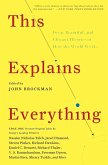Ever since we first became sentient, we have struggled with how to treat ourselves and others. Preliterate cultures typically came up with a list of basic rules (don't kill, don't steal), working things out piecemeal. Literate cultures came up with much more elaborate sets of rules, some of which have aged better than others. We are currently going through a radical cultural shift on the same scale as the shift from preliterate to literate culture. Both shifts involve not just more knowledge but new ways of organizing knowledge, which in turn affect how we treat ourselves and each other. The Renaissance and Enlightenment, triggered by rapidly increasing literacy rates in the West, saw a rapid increase in basic human rights as our empathy for people who are different from us went up. We now tell ourselves a story about how successful we've become, how enlightened, while many issues have yet to be resolved. Fortunately, the revolution is not over yet. With the relatively recent shift away from authoritarianism and towards the logic of complexity, the last couple of generations have seen rapid ongoing changes in how we see ourselves and others, including a dawning awareness of how complex dynamic interactions work, the new tools we need to understand them, and the extra time we need to grow up in order to master these tools. This book takes a historical tour through the evolution of how we understand the concepts of coercion and consent, taken through a lens of cognitive (conceptual) development and extending into the new territory of complexity. The future is full of amazing possibilities. This book is a follow-up to Why It Takes Ten Extra Years to Grow Up.
Hinweis: Dieser Artikel kann nur an eine deutsche Lieferadresse ausgeliefert werden.
Hinweis: Dieser Artikel kann nur an eine deutsche Lieferadresse ausgeliefert werden.








